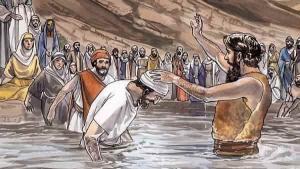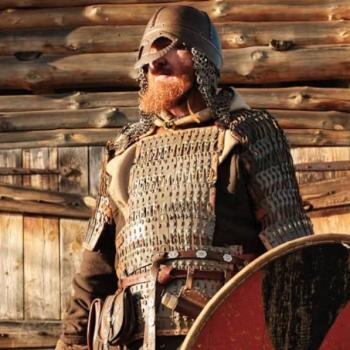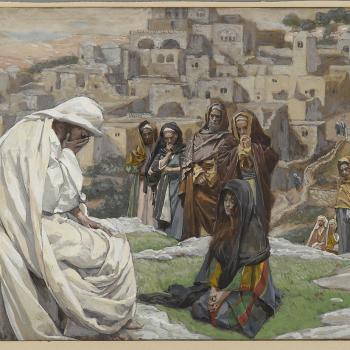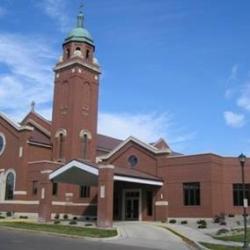
Some of Jesus’ first followers had trouble with Jesus’ baptism by John. If anything, Jesus should have baptized John. But the very first gospel said John baptized Jesus (Mark 1:9), and from there the Jesus communities had to deal with it.
The author of Matthew expresses his misgivings in words he attributes to the Baptist: “I need to be baptized by you, and yet you are coming to me?” Jesus replies, “Allow it now, for thus it is fitting for us to fulfill all righteousness.” Matthew was all about how Jesus fulfilled Jewish history and the law of Moses. I don’t know how baptism does that or what Matthew means by righteousness.
The Lukan Gospel skirts the issue by saying Jesus was baptized without specifying by whom. (Luke 3:21) John goes a step further. In the Johanine Gospel nobody baptizes Jesus. Instead John the Baptist goes into a long praise of Jesus, ending with
He is the one who will baptize with the holy Spirit. (John 2:33)
This discomfort of the early Church helps historical Jesus scholars conclude that Jesus’ baptism by John must actually have happened. No one would have made it up.
Why was Jesus baptized?
John baptized “for the forgiveness of sins.” (Mark 1:4) Mark says this without considering whether that meant Jesus must have had some sins. Subsequently the Church reasoned that baptism for Jesus couldn’t have been for the forgiveness of Jesus’ sins. A recent article in America Magazine has this explanation:
If Jesus is God’s own holiness, why did he undergo John’s baptism of repentance? What sort of righteousness had to be fulfilled, as our Savior himself put it to the Baptist? In a word: ritual. Christ gave himself to us in the ritual of baptism. His ministry and martyrdom would make good his gift.
The title of the article tells where the author is coming from: “Do humans make rituals—or do rituals make us human?” Of course, humans make rituals, but the rituals we undergo existed long before we did. These rituals help to make us who we are. Ritual is
… the house of our humanity. Our consciousness rose above its immediate environs when two humans first did something physical and personal as a way of sharing life with each other, sharing consciousness itself.
Like all the rest of us, Jesus became who he was through rituals.
At this point I feel like objecting: but Jesus already had rituals. Among the many other Jewish rituals, circumcision established Jesus’ identity as a male Jew. The answer to the objection, I think, has something to do with dying. Circumcision, though it involves shedding some blood, is really about life and the energies that create new life. For Jesus new life comes from the experience of death.
A scene at the Jordan River
Bear with me awhile because this is going to be weird. I think it’s possible, not necessarily likely, that Jesus was not baptized. Recall the scholarly assumption that Jesus must have been baptized by John. Nobody – no Jesus follower – would have made up that story. I think Mark might have made it up. He might have done so by giving a new meaning to baptism, one that wasn’t at all in the Baptist’s mind.
John chose the Jordan River as the scene for his baptisms for a reason. The crossing of the Jordan was a seminal event in the forming of the Israelite people. John’s return to the Jordan told people that this chosen people needed a reforming, a renewal. God’s people were formed symbolically in the waters of the Jordan River. In those same waters the Baptist intended that people’s re-formation.
The author of the Gospel that we call Mark’s does something interesting with those waters. He says people were going to John to be baptized “in” the Jordan River. Just like the Israelites when the whole people were “in” the river. But Jesus was baptized “into” the Jordan. The two words in the Greek language of this gospel exactly parallel English usage of “in” and “into.” The implication, as Ched Myers explains in Binding the Strongman, is that Jesus went under the water. That’s not what happened to those early Israelites. Assuming that John was repeating symbolically their experience, he probably wouldn’t have dunked his penitents.
Baptism into death
But Mark says Jesus went under the water. That changes the meaning of baptism from renewing life to dying first and then and rebirth. Of the first three gospels, Mark’s has the greatest emphasis on Jesus’ death. From the middle of the gospel on, Jesus keeps insisting on his destiny:
The Son of Man must suffer greatly and be rejected by the elders, the chief priests, and the scribes, and be killed, and rise after three days. (Mark 8:31)
And the disciples just as insistently refuse to hear or understand. Near the end, at the Transfiguration, the voice from heaven says, “Listen to him!” and they still don’t get it.
The author of Mark must have known about John’s baptism ministry and Jesus’ temporary association with that work. Assuming, with only that evidence, that John baptized Jesus wouldn’t have been unreasonable. Could the tradition of Jesus’ baptism have started with an author who wanted to insert the difficult theme of death into the very beginning of Jesus’ public life?
Evidence from the Gospel according to John?
Bible scholars long regarded John’s Gospel as highly theological and not very historical. More recently scholars recognize that John had his own independent historical sources. And John doesn’t mention Jesus’ baptism.
John, in his mystical way, had a great interest in death and baptism:
Amen, amen, I say to you, unless a grain of wheat falls to the ground and dies, it remains just a grain of wheat; but if it dies, it produces much fruit. (John 12:24)
Amen, amen, I say to you, no one can enter the kingdom of God without being born of water and Spirit. (John 3:5)
John could have fit Jesus’ baptism comfortably into his theology – if he had known about the baptism. So, possibly, John didn’t know about the baptism, and that could be because it didn’t happen.
The fact that John doesn’t mention the baptism is evidence, but it’s weak evidence. John describes a meeting of Jesus with the Baptist, and here’s some of what the latter says:
Behold the Lamb of God, who takes away the sin of the world. (John 1:29)
One of John the Evangelist’s main themes is Jesus, the Lamb of God. Ritual sacrifice of lambs was an essential feature of worship in the temple. John even has a different day for the crucifixion of Jesus—a day earlier than the three other gospels. This puts Jesus’ sacrifice on the cross at the very hour when lambs were being sacrificed in the temple for the coming Passover celebration.
John is sensitive to the way symbols work. I don’t think he would have wanted to picture a lamb being dunked in the Jordan River. That is not the way lambs were sacrificed. So even if John had known about Jesus’ baptism, he would have had good reason not to mention it.
What’s so radical about baptism into death – for us?
I still think it’s possible that Jesus was not baptized, but he probably was. So why this diversion, if that’s what it is? The point is the strong connection between baptism and death. We see it first in Mark and then, even stronger, in the fourth gospel. These two authors, at least, could easily accommodate a baptism of Jesus by John into their theologies..
We live in a world that, especially in this country, runs away from death. We sanitize funerals. Bodies of the dead are as pretty, “almost lifelike,” as possible. Embalming and expensive caskets keep the bodies from decaying as long as possible. We say, “They’re in a better place now,” as if death is just going through a door.
We also deny death by surrounding ourselves with more and more things. Could we ever die? We’re way too substantial for that. We have economic systems that ignore reality’s finitude and thus “cheat death.” That phrase is from William Cavanaugh, whom I wrote about here. In our pursuit of “eternal economic growth” (Greta Thunberg’s strong words at the U.N.), we even sacrifice the earth and our children’s future.
We Christians have all gone under the water of Baptism. Tomorrow is the Feast of the Baptism of the Lord. May Jesus’ Baptism free us to face reality, which includes finitude and death.
Image credit: Walk in the Light web page












